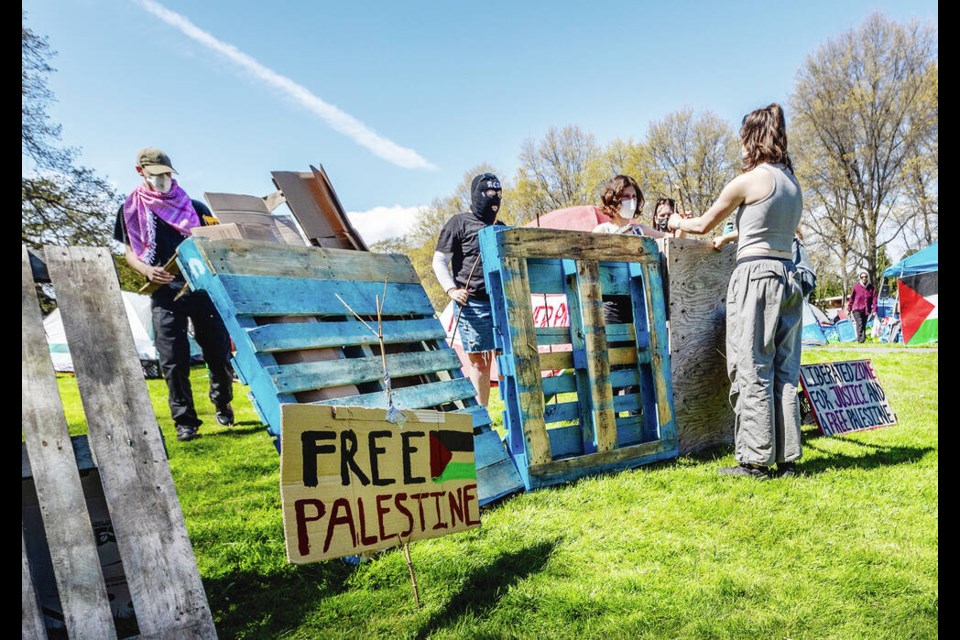Students at the University of Victoria have established a Palestine “solidarity encampment” on campus and say they will stay there until their demands are met.
People taking part “stand in solidarity with those steadfastly resisting in Palestine,” a statement released Wednesday said. “We invite the community to join us.”
Protesters want the university to divest from corporations supporting Israel, cut academic ties in Israel and “condemn the ongoing genocide of Palestinians.”
“After months of our protests and advocacy work being ignored by UVic administration, we will continue to stand our ground and the encampment will remain indefinitely until the university agrees to our demands and divests from genocide,” the statement said.
More than 20 tents and other gear dotted the quad — the central area near the McPherson Library — on Wednesday afternoon.
Protesters were talking in small groups or reading over the noon hour, and let out a cheer when about a dozen people carrying wooden pallets showed up. The pallets were later used by the protesters to build walls.
With the spring term over, the university was less crowded than usual. Saanich police had already stopped in at the camp and a UVic security vehicle was parked nearby. Police said they were increasing their presence in the area.
A masked protester who asked not to be named for safety reasons said the camp “kind of just sprung up in congruence with all the other encampments we’ve been seeing across North America.”
Citing American authorities moving in on camps at New York’s Columbia University and UCLA in recent days, the 24-year-old UVic alumnus said it’s “pretty terrifying to see the amount of police repression against peaceful protesters.”
“We know that our values are aligned with human rights,” she said. “Palestinians deserve to live on their land freely.”
She said people at the camp won’t tolerate any form of discrimination, including antisemitism.
Rabbi Harry Brechner, spiritual leader for Victoria’s Congregation Emanu-El synagogue, said framing the issue as a division between two sides — pro-Israel and pro-Palestine — is not “pro-peace.”
“A lot of the pro-Palestinian solidarity doesn’t feel like it’s pro-peace to me.”
Brechner questioned the call for cutting ties with Israeli academics, some of whom are peace activists, saying: “It seems to be counter to getting anything positive done.”
To achieve peace, he said, people from different groups will have to come together. “There’s a third narrative,” he said. “[The current situation] is part of the same stuck narrative that’s kept us in the conflict so long.”
Divestment is not an easy issue because the world economy is so linked, Brechner said, noting that Israeli technology is integral to many products.
He said that unlike what has been happening on some other campuses, he hopes UVic’s camp “can be an example of peaceful protest, and of being able to have dialogue and understanding.”
The protesters have demanded that UVic president Kevin Hall and the board of directors “call for an immediate and permanent ceasefire” in Gaza.
The statement also calls for no charges or academic penalties against students or faculty involved in the protest, and says police should be kept off campus.
“The police contribute to an environment that is unsafe for and directly harmful to BIPOC [Black, Indigenous and People of Colour] and other visible minorities,” it said.
A UVic spokesperson said in a statement that safety is the top priority.
“We are taking a calm and thoughtful approach to this demonstration and will work to minimize disruptions,” the spokesperson said. “The university supports peaceful demonstrations and the right to freedom of expression. Universities have always been a place for free speech — where students, staff and faculty can debate ideas.
“We encourage thoughtful, reasoned and academic discourse on current issues and maintain that these discussions must take place in an environment free from discrimination, harassment and hate speech of any kind.”
The spokesperson said that campus security is liaising with Saanich and Oak Bay police, and that out of an abundance of caution, security staff will be monitoring those accessing nearby buildings and could ask people for information before they are allowed to enter.
An official at Vancouver Island University in Nanaimo confirmed Wednesday a camp site had been set up on its campus, too.
The university said in a statement that it is “monitoring the situation on our Nanaimo campus and [is] in contact with local RCMP.”
Pro-Palestinian protesters have also set up encampments at the University of British Columbia, the University of Ottawa and McGill University in Montreal.
The encampments, the first of which was erected on Saturday, follow a wave of similar protests on campuses across the United States linked to the Israel-Hamas war.
In Quebec, a judge on Wednesday rejected a request for an injunction against the encampment at McGill.
Two students at the university had asked Quebec Superior Court to order protesters to move at least 100 metres from school buildings, saying their presence had created an environment of aggression.
Superior Court Justice Chantal Masse ruled Wednesday that the plaintiffs failed to demonstrate that their access to the school was being impeded.
— With a file from The Canadian Press



